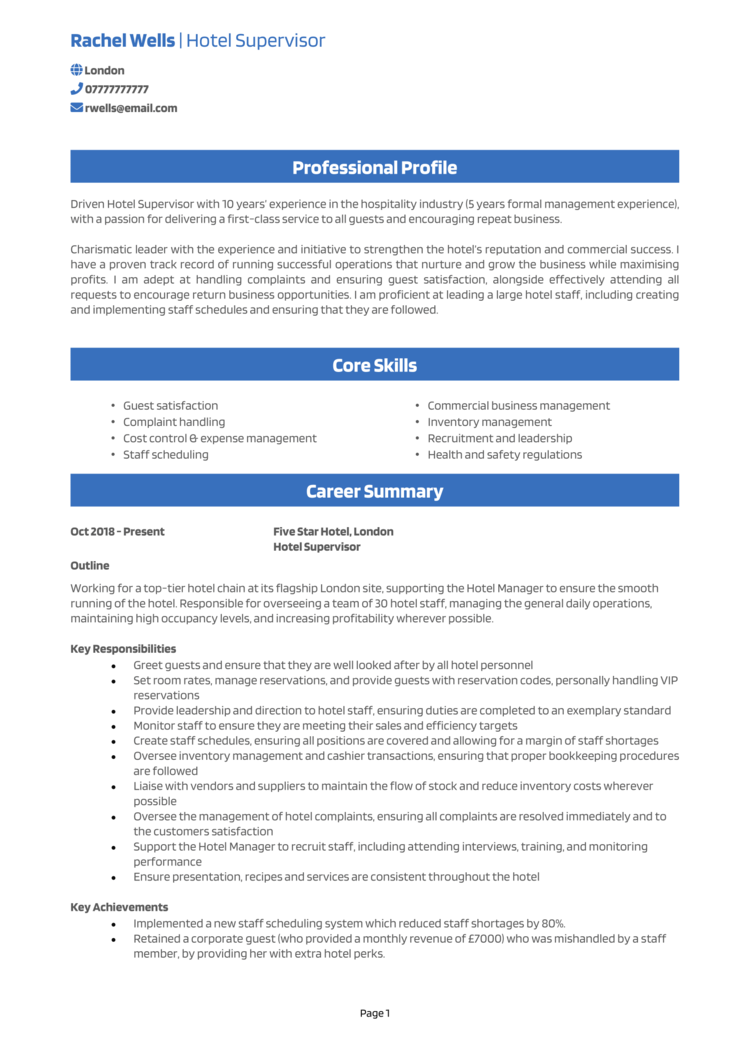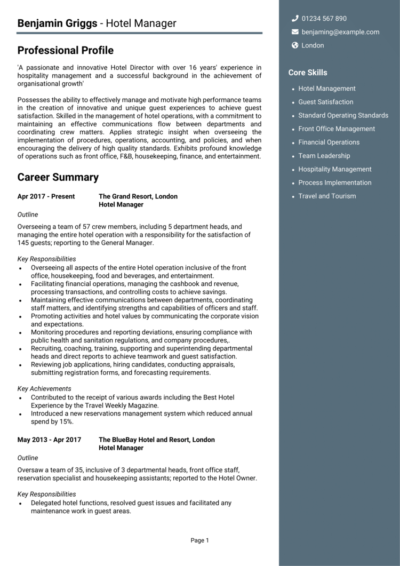In the hospitality world, you’re the one holding the keys and keeping everything running from check-in to check-out. But to land your next leadership role, you’ll need more than just customer service charm – you’ll need a polished CV that captures what makes you the perfect candidate.
This guide (with Hotel Manager CV examples) will help you structure your experience, highlight your leadership, and showcase the results you’ve delivered – so you’re not just managing expectations, but exceeding them.
Hotel Manager CV

Hotel Duty Manager CV

Hotel Supervisor CV

How to write your Hotel Manager CV
Discover how to craft a winning Hotel Manager CV that lands interviews with this simple step-by-step guide.
Hotel managers are expected to lead, organise, and problem-solve all at once – often before breakfast. Your CV should reflect that balance of structure and adaptability, showing recruiters you’re prepared to take charge and keep everything on track.
This guide will walk you through writing a CV that showcases your expertise in operations and guest satisfaction – whether you’ve led boutique stays or international chains.
How to structure and format your Hotel Manager CV


Hotel managers juggle dozens of moving parts daily – from front desk logistics to back-office decisions – and your CV should reflect that same sense of order and coordination. A coherently structured layout allows employers to quickly grasp your background and see the value you bring to the table. The easier it is for them to follow your experience, the more likely they are to stay engaged.
Here’s how your CV should be laid out for maximum readability:
- Name and contact details – Keep these personal details at the top so a potential employer can reach out to you.
- Profile – Immediately draw in the recruiter with a brief summary of your skills and experience
- Core skills – Make a quick-glance list of your most valuable and relevant capabilities.
- Work experience – List previous roles in reverse chronological order, focusing on your management history.
- Education – Include your degrees, hospitality management training, and compliance qualifications.
- Additional info – You can optionally list any relevant hobbies and interests which help to convey your fit for a leadership position.
Make sure your CV doesn’t overstay its welcome – two pages is the ideal length to showcase your career without overwhelming the reader. Use a clear and readable CV font, and break up content with concise bullet points to make your responsibilities and achievements easy to scan.
Divide each of those sections with consistent headings to guide the reader smoothly from one area to the next. A polished format which follows these simple tips reinforces your ability to present information clearly – just like a well-prepared guest briefing or front desk handover.
How to write a Hotel Manager CV profile


Think of your profile as your personal concierge – it introduces you, gives a sense of your style, and sets the tone for what’s to come. Whether you’re a hands-on manager who thrives during busy check-ins or a strategy-focused leader who drives revenue behind the scenes, this is your chance to show what makes you stand out. You’ve only got a few lines, so make them count like a well-timed upgrade for a VIP guest.
Hotel Manager CV profile examples
Profile 1
Experienced and service-driven Hotel Manager with over eight years of experience managing day-to-day operations in 4-star and boutique hotels. Skilled in team leadership, guest relations, budgeting, and health and safety compliance. Proficient in using Opera PMS and revenue management tools to maximise occupancy and guest satisfaction. Known for maintaining high service standards and motivating teams to deliver an exceptional guest experience.
Profile 2
Dynamic Hotel Manager with seven years of experience in the hospitality sector, overseeing front-of-house, housekeeping, and F&B operations in busy city-centre hotels. Strong track record in team development, customer service, and profitability. Adept at managing multi-departmental teams and handling high-pressure environments with professionalism and efficiency.
Profile 3
Results-focused Hotel Manager with nine years of experience in managing hotel operations across resort and urban properties. Expertise in guest service delivery, staff supervision, and financial performance management. Proficient in hotel systems including Protel and RMS Cloud. Committed to ensuring smooth daily operations while upholding brand values and delivering consistent quality.
Details to put in your Hotel Manager CV profile
Here’s what to include:
- Where you’ve worked – Mention the type of hotels you’ve managed (boutique, resort, corporate, etc.).
- Your top qualifications – Include hospitality degrees or management training.
- Essential skills – Touch on team leadership, financial oversight, or guest satisfaction.
- Specialities or focus areas – Such as revenue growth, event management, or multi-site leadership.
- Business impact – Highlight results like increased occupancy or improved service ratings.
What to include in the core skills section of your CV


Your CV skills section is a quick list which gives recruiters a taste of what you bring to the role before they dive into the details. Don’t make the mistake of treating it like a laundry list of buzzwords. Instead, use it to highlight the strengths that matter most in your kind of hotel, from operations know-how to people management skills.
Tailor it to the job you’re going for, keep it neat and relevant, and make sure each item earns its place – generic soft skills and fluff will only leave recruiters rolling their eyes.
What are the most important skills for a Hotel Manager CV?
- Operational Management – Overseeing daily hotel operations including front desk, housekeeping, food and beverage, and maintenance services.
- Staff Leadership and Development – Recruiting, training, and supervising staff to ensure high service standards and team performance.
- Guest Experience and Satisfaction – Ensuring exceptional guest service, handling complaints professionally, and implementing feedback for continuous improvement.
- Revenue and Budget Management – Managing budgets, controlling costs, and maximising revenue through pricing strategies and occupancy optimisation.
- Sales and Marketing Coordination – Collaborating with marketing teams to promote the hotel, increase bookings, and maintain brand presence.
- Health, Safety, and Legal Compliance – Ensuring adherence to local regulations, hygiene standards, and safety procedures across all departments.
- Reservation and Booking Oversight – Monitoring booking systems, analysing trends, and managing availability to maximise occupancy.
- Supplier and Vendor Management – Negotiating contracts and maintaining relationships with suppliers for goods, services, and maintenance.
- Event and Conference Coordination – Overseeing planning and delivery of meetings, weddings, and special events hosted by the hotel.
- Performance Monitoring and Reporting – Analysing key performance indicators (KPIs) and preparing reports for senior management and ownership groups.
How to write a strong work experience section for your CV


This section is where you show how you’ve brought strategy and service together to create smooth-running, successful hotel operations. Whether you’ve managed a single property or multiple locations, highlight how you’ve led teams and hit performance goals.
List your past work experience roles in reverse chronological order. For each, include your job title, hotel name, and dates. Then use bullet points to break down your key responsibilities and results – focusing on team leadership, financial performance, operational improvements, and guest satisfaction.
The best way to structure job entries on your CV

- Outline – Describe the hotel, your position, and your scope of responsibility.
- Responsibilities – Use power words like “led,” “improved,” “implemented,” or “oversaw” to detail how you ran day-to-day operations.
- Achievements – Quantify results where possible: “Increased average occupancy by 12%,””Improved TripAdvisor rating from 3.8 to 4.5,” or “Reduced staff turnover by 30%.”
Sample jobs for Hotel Managers
Hotel Manager | Ashmore Court Hotel
Outline
Oversaw daily operations of a 60-room boutique hotel, managing a team of 25 staff and ensuring exceptional guest service across all departments.
Responsibilities
- Directed front desk, housekeeping, maintenance, and F&B teams to maintain operational efficiency.
- Monitored guest satisfaction scores and resolved complaints promptly and professionally.
- Prepared monthly reports on occupancy, revenue, and departmental performance.
- Implemented training programmes to improve customer service and staff development.
- Worked with marketing and sales to drive bookings and increase direct reservations.
Achievements
- Raised average occupancy from 68% to 85% within 12 months through improved booking strategy.
- Achieved a 4.7-star rating on TripAdvisor by consistently meeting guest expectations.
- Reduced staff turnover by 30% by introducing performance incentives and training schemes.
Hotel Manager | Riverpine Executive Suites
Outline
Managed operations of a 4-star business hotel catering to corporate clients and long-stay guests, ensuring a high level of service and operational efficiency.
Responsibilities
- Managed departmental budgets and controlled operating costs to improve profit margins.
- Coordinated daily briefings and set service standards across all guest-facing departments.
- Liaised with corporate accounts and handled VIP reservations and special requests.
- Monitored health and safety compliance and managed risk assessments.
- Led recruitment, training, and performance appraisals of hotel staff.
Achievements
- Increased RevPAR by 22% through dynamic pricing and direct booking campaigns.
- Maintained 95%+ audit compliance for three consecutive internal reviews.
- Recognised by corporate partners for delivering consistent quality during conference bookings.
Hotel Manager | Southbay Coastal Resort
Outline
Directed full-scale operations at a 90-room beachfront resort, managing seasonal fluctuations, large events, and a rotating team of 40+ staff.
Responsibilities
- Oversaw all departments including reception, events, kitchen, and leisure facilities.
- Organised staff rotas, coordinated shift planning, and ensured service coverage.
- Handled customer feedback and implemented service improvements based on reviews.
- Managed supplier relationships, procurement, and inventory control.
- Reported financial performance to head office and managed P&L statements.
Achievements
- Boosted average event revenue by 18% by developing all-inclusive wedding and retreat packages.
- Improved booking efficiency by streamlining OTA and direct channel management.
- Led successful renovation of the lobby and guest lounge area with minimal disruption to guests.
How to list your educational history


Hospitality is as much about professionalism as it is about personality. Use the education section to highlight formal training and relevant qualifications that prove you’re equipped to lead in a competitive industry.
List your highest level of education first – such as a hospitality management degree – then follow with additional training, like leadership programmes or health & safety certifications. Industry-specific systems or property management software training can be mentioned too.
What are the best qualifications for a Hotel Manager CV?
- BA/BSc in Hospitality Management or Hotel & Tourism – Industry-standard qualification.
- Level 4/5 Diploma in Hospitality Management – Professional leadership-focused training.
- IOSH or Health & Safety in the Workplace (Level 2/3) – Important for compliance and staff safety.
- First Aid at Work Certification – A valuable extra in customer-facing environments.
- Training in PMS Software (Opera, Protel, etc.) – Demonstrates familiarity with hotel management systems.





